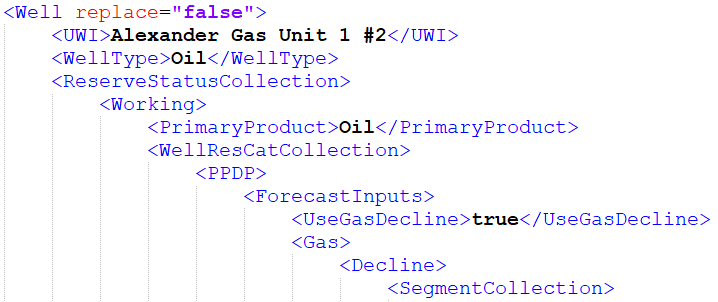another replacement request for help
-
haha thanks.
May I ask another question?
What if I needed to change another field as well?
For example in the image below:

I find the name Aery #B1H in the file but then I need to change the Welltype from Oil to Gas (Or viceversa).
In this case the I would not be replacing the searched word (Aery #B1H), but another field occurring later in the same entry (<Welltype>Oil to Gas)
Thanks again -
I would think this is a find/replace action.
Find:<UWI>Aery #B1H</UWI>\R\h*<WellType>\K.+?(?=</WellType>)
Replace:Gas
tick regular expressionBecause of the usage of the
\Ksyntax you can only use replace all button. -
@Ekopalypse said in another replacement request for help:
\R\h
Thanks It works, but I would need to do one by one.
Again I would have a list of different names (Aery #B1H, Aery #D2H, etc) so I was looking for another magic script haha -
but then we would need some kind of mapping again,
otherwise the script does not know when to use what. :-) -
So this is how the xml file looks

<Well replace=“false”>
<UWI>Alexander Gas Unit 1 #2</UWI>
<WellType>Oil</WellType>
<ReserveStatusCollection>
<Working>
<PrimaryProduct>Oil</PrimaryProduct>
<WellResCatCollection>and this is how the replacement file would be


Alexander Gas Unit 1 #2 Oil Gas
Alexander - Wessendorff 1 A3H Oil Gas
Alexander - Wessendorff 1 A4H Oil GasSo the script would look for the first column (Well name), and then replace the word in the second column for the one in the third column:
<WellType>Oil</WellType> to <WellType>Gas</WellType>
Thanks again, you’re saving my life
-
Is the oil column really needed?
I mean, does it needs to be checked or can the script always look for company and then replace whatever is in WellType with the value from the Gas column? -
Edit:
Thinking about, no, no need for that column -
This post is deleted! -
so you can get rid of the second column and the only thing we need to change is the find expression, I guess.
-
from Npp import editor1, editor2 replacements = dict(line.split('\t') for line in editor2.getText().splitlines() if line) def replace_with(m): return replacements[m.group(1)] # search_for = '(?<=<UWI>).+?(?=</UWI>)' search_for = '<UWI>(.+)</UWI>\R\h*<WellType>\K.+?(?=</WellType>)' editor1.rereplace(search_for, replace_with) -
btw. if you are interested how these regex search work see here for a pretty good description.
-
Thanks again for your help.
For some reason this time it isn’t working.
I will try and fix it.
-
Can you open the PythonScript console (plugin->PythonScript->Show Console) to see if there is an error?
The replacement file has company and gas/oil tab separated, correct? -
@Ekopalypse here is the log.
I think it is because not all the wells need to be changed, so the first one in the file (Aery #B1H) does not appear in the second file, so the script is stopping. I will try leaving all wells, even those that doesnt need to be changedTraceback (most recent call last):
File “C:\Users\AppData\Roaming\Notepad++\plugins\Config\PythonScript\scripts\find_replace.py”, line 10, in <module>
editor1.rereplace(search_for, replace_with)
File “C:\Users\AppData\Roaming\Notepad++\plugins\Config\PythonScript\scripts\find_replace.py”, line 6, in replace_with
return replacements[m.group(1)]
KeyError: ‘Aery #B1H’And yes, the other file is separated by tabs.
-
Yes, that makes sense then we need to take another approach where we
create the searches based on the second list. Gimme a minute -
from Npp import editor1, editor2 replacements = dict(line.split('\t') for line in editor2.getText().splitlines() if line) def replace_with(m): return replacements[m.group(1)] # search_for = '(?<=<UWI>).+?(?=</UWI>)' for company in replacements.keys(): search_for = '<UWI>({})</UWI>\R\h*<WellType>\K.+?(?=</WellType>)'.format(company) editor1.rereplace(search_for, replace_with) -
depending on the file size a faster solution might be this
from Npp import editor1, editor2 replacements = dict(line.split('\t') for line in editor2.getText().splitlines() if line) def replace_with(m): company = replacements.get(m.group(1), None) if company: return replacements[m.group(1)] else: return m.group() # search_for = '(?<=<UWI>).+?(?=</UWI>)' search_for = '<UWI>(.+)</UWI>\R\h*<WellType>\K.+?(?=</WellType>)' editor1.rereplace(search_for, replace_with)Only scanning the text one time and in case the company found is
not in the replacements dictionary we replace it with what was found.
Btw. its midnight here - good night. -
The first one worked!
Thanks so much for your help, I owe you a beer!
Have a good night -
By the way, I went back and edited the script to run a second time looking for another instance below.
I’m sure there are better ways to jump three lines, but it’s late and I needed to finish. It worked! haha
from Npp import editor1, editor2 replacements = dict(line.split('\t') for line in editor2.getText().splitlines() if line) def replace_with(m): return replacements[m.group(1)] # search_for = '(?<=<UWI>).+?(?=</UWI>)' for company in replacements.keys(): search_for = '<UWI>({})</UWI>\R\h*.*\R\h*.*\R\h*.*\R\h*<PrimaryProduct>\K.+?(?=</PrimaryProduct>)'.format(company) editor1.rereplace(search_for, replace_with) -
I’m sure there are better ways to jump three lines,
In the end, what really counts is whether it does what it is supposed to do, right?
One, of several alternatives would be for example<UWI>(.*)</UWI>(?s)(\R.+?)<PrimaryProduct>\K.+?(?=</PrimaryProduct>)but whether this is better or worse depends on the real data.